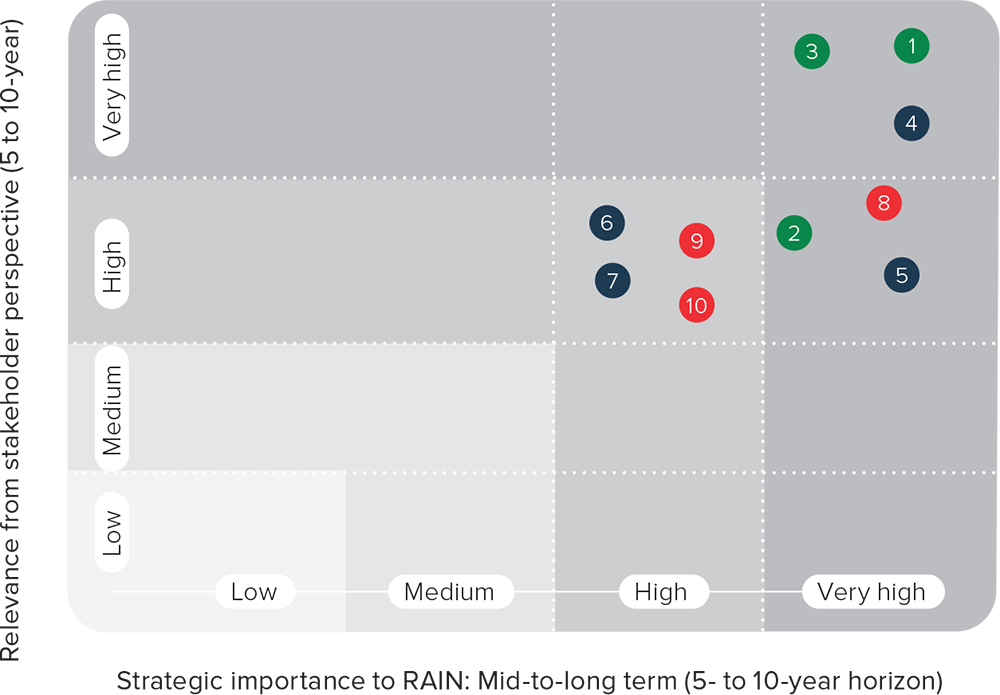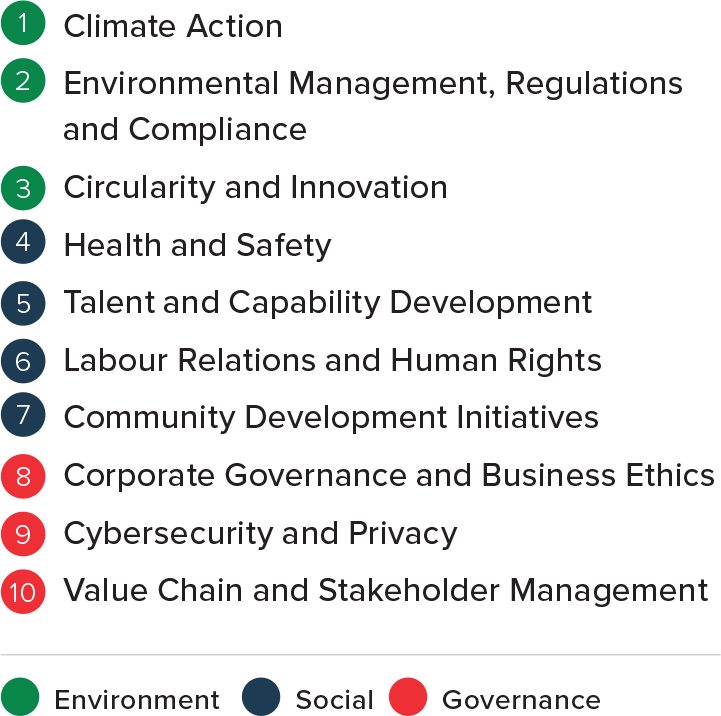Introduction
Who we are
How we performed
How we create value
Value creation through capitals
Governance
Statutory reports
Financial statements
Annexures
At RAIN, we integrate materiality into our strategic approach, ensuring long-term value creation. Understanding our key impacts, risks and opportunities enables us to align our business with evolving sustainability expectations while fostering resilience and innovation.
Our materiality journey began in 2021 when RAIN's Carbon and Advanced Materials segments conducted their first materiality assessment to identify key sustainability topics. This process was instrumental in shaping our Company's sustainability strategy by aligning its business priorities with industry standards and stakeholder expectations. The assessment followed a structured approach, leading to the identification of material topics that were reviewed and validated by the RAIN Sustainability Steering Committee (SSC). This initial framework set the foundation for integrating ESG considerations into our Company's broader strategic vision.
By 2023, our Company conducted a thorough review of its material topics to ensure alignment with evolving sustainability priorities. This resulted in the addition of Labour & Human Rights and Business Ethics & Governance, further strengthening our ESG focus. Some topics were refined to enhance clarity and better reflect our Company's objectives, such as renaming 'Organisational Resilience' to 'Talent and Capability Development' and 'Circularity of Feedstocks' to 'Circularity'. These refinements ensured that the Company's material topics continued to reflect its operational realities and stakeholder interests effectively.
In 2024, RAIN advanced to a double materiality approach, broadening the scope to assess not only how our Company's operations impact the environment and society but also how sustainability topics influence business performance. This process was conducted in collaboration with an external service provider and included structured stakeholder evaluations. However, RCL has not yet conducted a double materiality assessment. Based on these assessments and internal reviews, ten final material topics were identified as our Company's key sustainability focus areas.
These ten material topics have been categorised under three broad focus areas—Environmental, Social and Governance (ESG)—to serve as the foundation of RAIN's sustainability roadmap. Each business segment, is now developing businessspecific strategies with targets aligned to these priorities. This structured approach enhances RAIN's ability to drive sustainable growth, mitigate risks and create long-term value while reinforcing its commitment to ESG excellence.
RAIN's Carbon and Advanced Material segments identified material topics relevant to their business and sustainability strategy by referencing key sustainability frameworks, such as the GRI, IFRS and ESRS. This ensured alignment with regulatory requirements and industry best practices. Inputs were gathered internally to identify sustainability risks and opportunities.
A peer benchmarking analysis was conducted to validate the relevance of identified topics. This helped refine the list by comparing sector trends, emerging ESG issues and industry-leading sustainability practices while aligning with RAIN business operations.
Stakeholder engagement was essential in assessing materiality. A survey collected input from investors, customers, employees, suppliers and community representatives, while internal stakeholders ensured alignment with business priorities. These insights helped prioritise topics based on impact, regulatory importance and relevance to sustainability goals.
The shortlisted topics were evaluated from two perspectives:
Impact materiality (inside-out)
How RAIN's operations affect the environment and society,
considering both positive and negative impacts.
Financial materiality (outside-in)
How ESG issues influence financial performance, covering
risks like regulatory compliance, reputation, operational
efficiency and market positioning.
The topics were assessed on criteria like scale, scope, irremediability and likelihood, ensuring a balanced evaluation of its significance to both the Company and stakeholders.
Based on survey results and prior assessments, ten final material topics were identified through the Double Materiality Assessment (DMA). After careful consideration and review by the SSC, the scope of the topics was broadened to include all three of RAIN's segments. These topics were then officially adopted as RAIN's material topics with key sustainability focus areas, shaping future ESG initiatives, reporting and risk management.

Set the Vision and Oversee Progress Strategic oversight and alignment with corporate values.

Drive Strategy and Make Action Plans Establish key initiatives and allocate resources effectively.

Implement and Manage Programs Develop and coordinate sustainability programs across the organisation.

Execute Initiatives on the Ground Deliver tangible results through focused action and innovation.



RAIN is committed to mitigating climate change through investments in renewable energy, waste-heat recovery systems and energy efficiency initiatives. By prioritising green energy sources and reducing emissions across our operations, we actively contribute to global decarbonisation efforts.
We integrate environmental stewardship into our operations by complying with environmental regulations. Through efficient resource utilisation, pollution control technologies and proactive environmental monitoring, we minimise our ecological footprint.
All three of our business segments exemplify segment exemplifies innovation through upcycling industrial byproducts into high-value products. We continue to explore circular economy opportunities to reduce waste and create sustainable solutions for diverse industries.

We prioritise workplace safety by implementing stringent Occupational Safety and Health Administration (OSHA) guidelines and global best practices. Continuous employee training and state-of-the-art safety protocols ensure a safe working environment across all our facilities.
Recognising that people are our greatest asset, we invest in continuous learning and skill development. Leadership programmes, technical training and employee engagement initiatives enable our workforce to thrive and contribute to organisational success.
We are dedicated to fostering a respectful and inclusive workplace. By promoting equitable labour practices, adhering to international human rights frameworks and engaging with employee unions, we ensure harmonious labour relations across the organisation.
Through the Pragnya Priya Foundation, RAIN focuses on community welfare, including education, healthcare and skill-building programmes. Our community engagement initiatives aim to improve lives and foster sustainable development in the regions we operate.

Our governance framework is built on transparency, accountability and ethical practices. We adhere to corporate governance standards and regulatory compliance to safeguard stakeholder interests and foster trust in all our business dealings.
To safeguard data and maintain business continuity, we have implemented advanced cybersecurity protocols and privacy measures. Continuous monitoring and employee training ensure that our digital infrastructure remains secure and robust.
We strive to build a resilient value chain by maintaining strong relationships with suppliers and customers. Our proactive stakeholder management approach ensures operational continuity and mutual growth in a dynamic global environment.